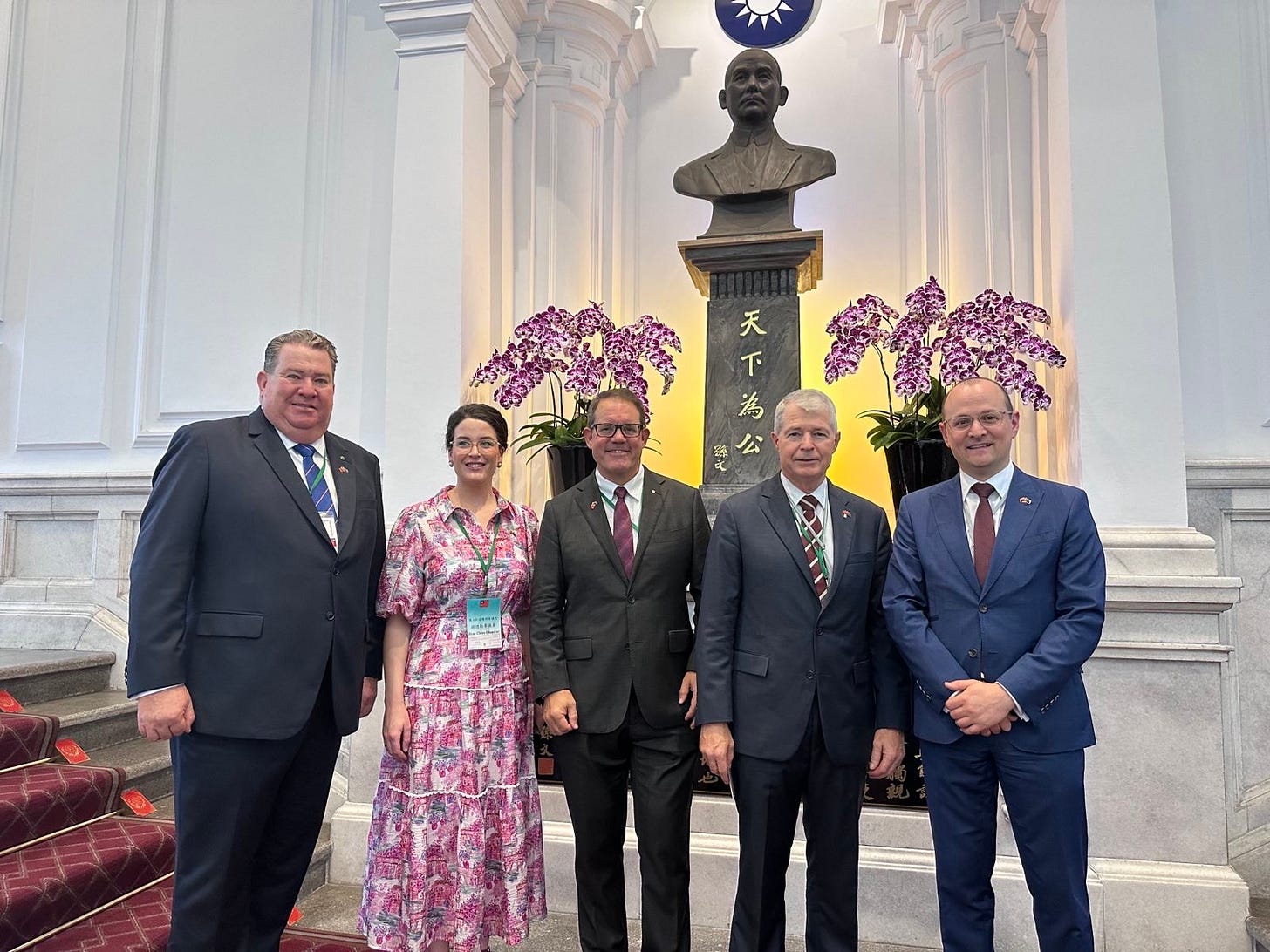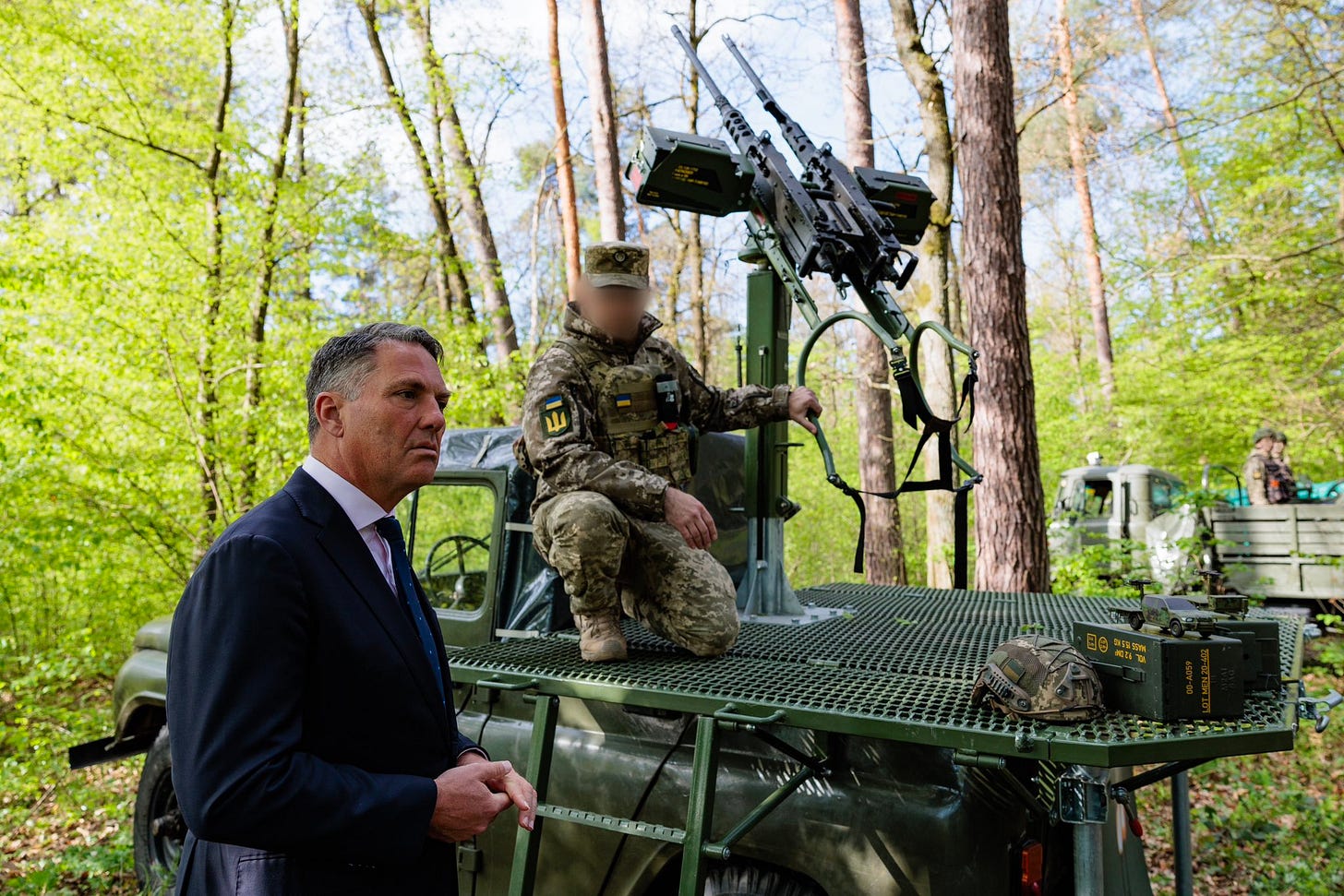Stabilisation despite drama, Australia's China choice on Ukraine, and politicising bilateral ties
Weeks of 13 May to 2 June 2024
This is the free fortnightly(-ish) BCB newsletter. For readers looking for breaking analysis of major bilateral developments, BCB now also offers a paid subscription add-on. BCB in Brief provides quick assessments of the big stories shaping the Australia-China relationship. You can upgrade to a paid subscription here:
Bilateral stabilisation despite more drama
Minister for Trade and Tourism Don Farrell speaking to the ABC on 30 May:
“[A]ll of the indications I get from [Minister of Commerce Wang Wentao] is that, like us, they want to put these issues [of trade restrictions] behind us.”
Quick take:
Among other points of tension these past three weeks, China took issue (here and here) with Australian parliamentary presence at the Taiwanese presidential inauguration on 20 May and media coverage earlier that month of foreign interference by the Chinese security services. Meanwhile, Australia expressed deep concern on 30 May about the guilty verdict handed down in Hong Kong to Australian citizen Gordon Ng. Then Treasurer Jim Chalmers ordered several Chinese and China-linked entities and individuals to dispose of holdings in rare-earth elements miner Northern Minerals on 2 June. This decision was taken in response to what appears to have been an effort by the China-linked Yuxiao Fund to circumvent a February 2023 rejection of its bid to increase holdings in the Australian miner. After the Treasurer issued his disposal order, a ransomware group publicly claimed to have stolen data from Northern Minerals during a cyber-attack in March. Despite the suspicious timing, it remains to be seen whether this was a state-backed hack.
These developments unsurprisingly prompted domestic objections in Australia (here, here, here, here, and here). But none of that was enough to seriously dampen the Australian and Chinese governments’ general positivity about prospects for the relationship (here, here, here, here, and here). With Australian wine exports to China surging in April after the removal of Beijing’s duties in March and more red meat processing establishments regaining access to the Chinese market on 30 May, bilateral optimism continues to rise in the lead up to Premier Li Qiang’s mid-June visit. Even the Australian federal Budget seems to have been crafted with a view to the ongoing stabilisation of Australia-China relations. It included “$2 million for Austrade to provide additional surge support for affected Australian agricultural exporters to re-establish commercial connections in China and continue to diversify into other markets.” Many potential sources of bilateral instability continue to simmer. But both Canberra and Beijing appear to be planning for a future in which they don’t boil over—at least not enough to seriously destabilise the relationship.

Australia’s China choice on Ukraine gets sharper
Ukrainian President Volodymyr Zelenskyy speaking in Singapore on 2 June:
“With China’s support to Russia, the war will last longer.”
Quick take:
In the wake of the Russian invasion of Ukraine, Australia has sanctioned both Moscow and its international military supporters (here and here). Most recently in May, Australia joined a forceful international statement calling out North Korea-Russia cooperation and imposed additional targeted sanctions on North Korean entities for providing defence materiel to Russian forces. Yet Australia has so far not turned its sanctions crosshairs on Russia’s most consequential international supporter. Even as large Chinese banks avoid transacting with Russia and the extent of China’s arms sales remains a matter of debate (here and here), there’s little doubt about the criticality of the diplomatic, economic, and technological lifeline provided by Beijing. As well as amplifying Moscow-friendly messages and undermining Kyiv’s negotiating position, China has consolidated its status as Russia’s top trade partner and played an indispensable role in sustaining the Russian military. For example, Chinese customs data shows that each month China is “exporting over [US]$300 million worth of dual-use products identified … as ‘high priority’ items necessary for Russia’s weapons production.”
All this creates a conspicuous China-shaped gap between Australia’s words and deeds on Ukraine. Canberra says that “those who provide material support to Russia’s illegal and immoral war will face consequences” and yet it won’t sanction Chinese companies that are servicing the Russian military. Australia publicly questions China’s support for Russia and yet Beijing’s decision to shun the Swiss-organised Summit on Peace in Ukraine has been met with a muted response from Canberra. And around the same time that many other world leaders are meeting in Switzerland to forge a “path towards a just and lasting peace in Ukraine,” Prime Minister Anthony Albanese will be feting Premier Li and spruiking Australia as a reliable trading partner for the country that is also Russia’s prime diplomatic, economic, and technological backer.
Of course, there are many complex and competing equities at play for the Albanese government as it tries to balance its commitment to Ukraine and the stabilisation of relations with China. The Australian public wants to help Ukraine and China’s support for Russia further threatens the system of “international rules and norms,” which successive governments have identified as critical to Australia’s security and prosperity (here and here). But Canberra also wants more relationship repair with Beijing. The Albanese government is still trying to get China to remove its remaining trade restrictions and Australia doesn’t want to endanger its high-level diplomatic access in Beijing. Despite all the recent positivity about the bilateral relationship, there’s a risk Beijing will again punish Australia if Canberra takes concrete actions against Chinese companies aiding Russia’s war effort or more forcefully calls out China’s complicity in Russian military aggression. China might, for example, delay the removal of the last trade restrictions on lobster and red meat, once again rebuff Canberra’s requests for ministerial meetings, or perhaps even reimpose some trade restrictions.
Although I’ve previously made the case for more Australian support for Ukraine, one could equally argue that sanctioning Chinese companies and mounting stronger criticisms of China could destabilise bilateral ties without changing Beijing’s calculus regarding its support for Moscow. Indeed, even the EU, UK, and US sanctions on Chinese companies don’t seem to have staunched the flow of dual-use goods or deterred China from supporting Russia. Be that as it may, responding to China’s support for Russia with enduring caution certainly doesn’t provide any extra incentive for Beijing to rethink its position. Worse still, it also risks undermining the credibility of Australia’s “unwavering” support for Ukraine. It’s hard to claim, as Minister for Foreign Affairs Penny Wong has, that “those who provide material support to Russia’s illegal and immoral war will face consequences” when one remains unwilling to take stronger legal and diplomatic actions against Russia’s most consequential international supporter.
Deceptive political posturing on bilateral ties
Minister for Agriculture, Fisheries and Forestry Murray Watt speaking in Canberra on 15 May:
“Our predecessors … broke the relationship with our biggest export customer, resulting in the halting of trade and zero dialogue between Australia and China. We’ve fixed that, with a bit more work to be done.”
Quick take:
Despite criticising the Coalition for politicising the Australia-China relationship, the Albanese government has its own track record of seeking to score political points about bilateral ties. On top of older examples of Prime Minister Albanese’s politicisation, he claimed on 7 May that the “former Government couldn’t have a phone conversation, let alone meetings [with China].” The Prime Minister repeated a version of this claim in Parliament on 14 May, accusing the Coalition of never having “a phone call, let alone a meeting, during their entire last term in office—nothing.” In another example, Minister for Defence Richard Marles said on 2 June: “there was no phone when those- when the liberals were in power. I mean, they had absolutely no ability to communicate with China at all about anything.”
It makes sense that the Albanese government would want to highlight the progressive repair of trade and diplomatic ties between Australia and China over the last couple of years. And trumpeting this bilateral turnaround is especially understandable with a federal election on the horizon. Yet the above and similar party-political claims about bilateral relations are false and misleading. Contrary to assertions from the Prime Minister and his colleagues, there was high-level contact between Canberra and Beijing even during the Coalition’s final term in office. This included at least two leader-level discussions (here and here) and two Australian ministerial visits to China (here and here). Moreover, even when the relationship went into steep decline in early 2020, the Australian and Chinese governments were still in regular, albeit lower-level, contact via diplomats and officials.
But perhaps even worse than those errors of fact is the way in which the Albanese government’s politicisation risks absolving Beijing of responsibility for the punishment it meted out on Australian businesses, communities, and individuals. Any thorough assessment of the last few years of bilateral ties should involve critically scrutinising the diplomacy and policies of the previous Coalition government. Yet it would also be a deceptive oversight to not factor in Beijing’s role and simply saddle the Morrison government with sole responsibility for the sour state of the Australia-China relationship in recent years.
Granted, one obviously shouldn’t always expect even-handed accuracy from politicians. But by overlooking China’s role in the previous downturn in bilateral ties, the Albanese government is establishing a standard that it might later regret. As well as cooperating with China and engaging in the national interest, the Albanese government has long insisted that it won’t shy away from “disagree[ing] where we must.” Considering China’s ongoing support for Russia, systematic and severe human rights abuses, dangerous military manoeuvres, and much else, Canberra will need to regularly register objections with Beijing. And given the large number of these issues on which Australia and China must sometimes disagree, it’s entirely possible that Beijing will at some point take severe umbrage and reimpose punitive measures, such as a diplomatic freeze or trade restrictions. But if one was to apply the same standard sometimes used by Prime Minister Albanese and some of his colleagues, then such a scenario of China reimposing punitive measures might be construed as an example of the Australian government, to use Senator Watt’s words, breaking “the relationship with our biggest export customer.” Just as Beijing shouldn’t be absolved for its economic coercion and denial of high-level diplomatic contact when the Coalition was in power, the Albanese government shouldn’t be saddled with total responsibility for any and all bilateral downturns that might happen now and in the future.
As with every bilateral relationship, China has agency in its ties with Australia. China’s words and deeds were Beijing’s choices when the Coalition was in power, are Beijing’s choices now, and will be so in the future. By giving the impression that the previous turbulence in the Australia-China relationship was the sole responsibility of the Coalition, the Albanese government robs Beijing of its agency. And likewise, it would unfairly deny Beijing its agency to only blame the Albanese government for future decisions that China might take to punish Australia again. It’s understandable that the Albanese government would seek to reap political rewards from the ongoing repair of the Australia-China relationship. But doing so shouldn’t mean solely blaming the Coalition and breezing by Beijing’s role in past relationship disrepair.
As always, thank you for reading, and please excuse any errors (typographical or otherwise). Any and all objections, criticisms, and corrections are very much appreciated.




